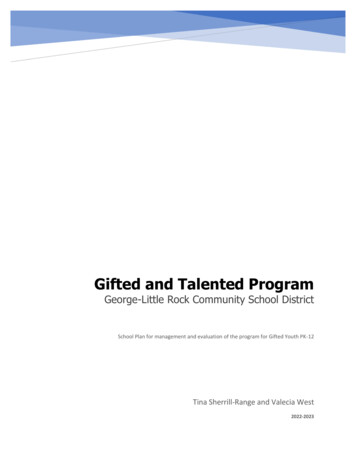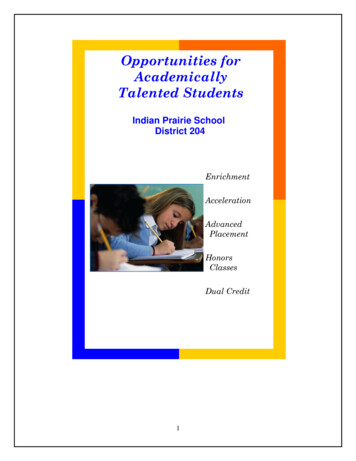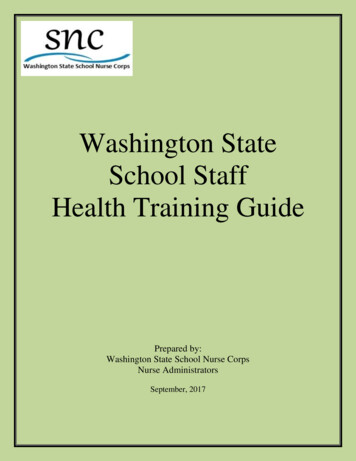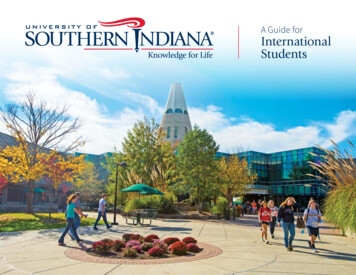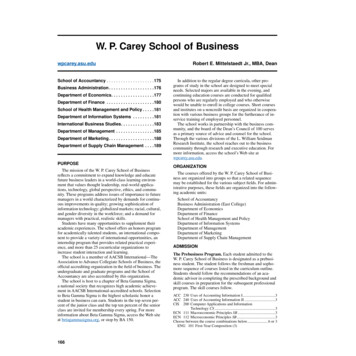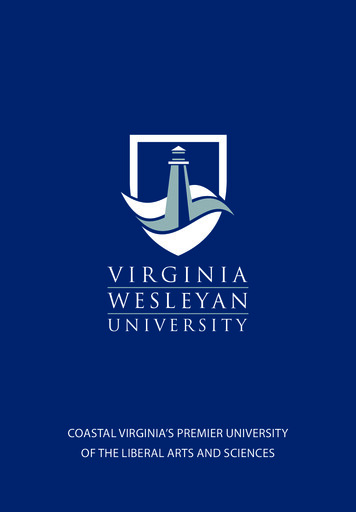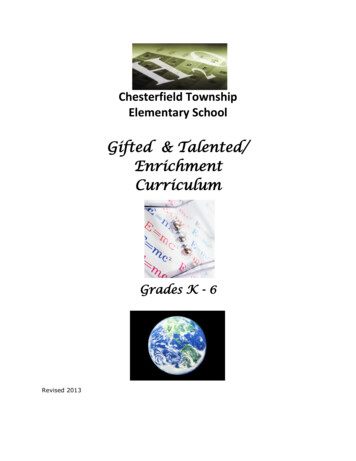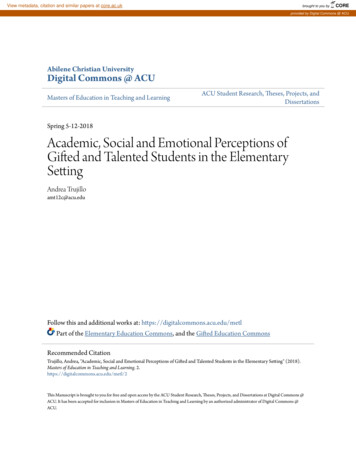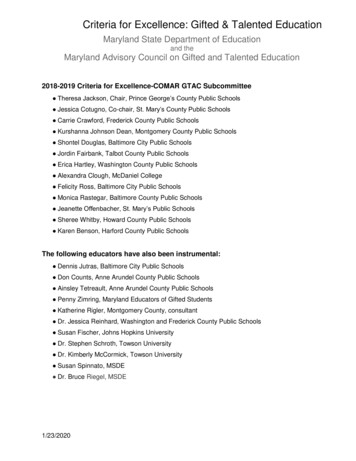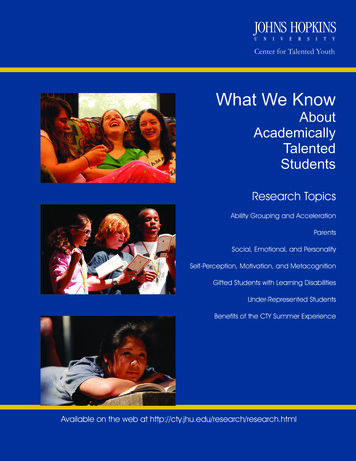
Transcription
Center for Talented YouthWhat We KnowAboutAcademicallyTalentedStudentsResearch TopicsAbility Grouping and AccelerationParentsSocial, Emotional, and PersonalitySelf-Perception, Motivation, and MetacognitionGifted Students with Learning DisabilitiesUnder-Represented StudentsBenefits of the CTY Summer ExperienceAvailable on the web at http://cty.jhu.edu/research/research.html
July 2007 Johns Hopkins UniversityCenter for Talented Youth
table of contentsAbility Grouping and Acceleration . page 1Abiltity grouping has been shown to be an appropriate and effective way to meet theacademic needs of highly able students. page 1Many highly able students have never been placed in ability grouped classes in theirregular school . page 1After attending a CTY summer course in math and/or science, the majority of studentswere appropriately placed in an advanced-level course at their home school . page 2Acceleration has been shown to be an appropriate practice for meeting the needs ofacademically talented students . page 3There is no evidence to support the notion of negative social and emotional consequences of acceleration for talented students as a whole .page 3Parents . page 5Most academically talented students have positive feelings about their families . page 5Although parents of academically talented students generally have highexpectations for their child to achieve, students report that they can meetthese expectations .page 5Sixty percent of parents of academically talented students emphasize internal (i.e.,relative to the individual) standards or both internal and external standards . page 5Few parents have an achievement goal (for their children) that focuses only oncompetence and attainment of socially-set standards (e.g., high grades andhigh test scores .page 6Social, Emotional, and Personality . page 7i
table of contentsMost academically talented students feel socially successful and happy withtheir friendships . page 7Academically talented students have a variety of friends . page 7Most academically talented students are satisfied with their physical abilitiesand physical appearance .page 7Encouraging high standards for gifted students does not promote thedevelopment of negative forms of perfectionism . page 8Academically talented students do not report lower self-perceptions overall thanthan other adolescents .page 8The majority of students report a social benefit, as well as an academic benefit,from taking a CTY summer course .page 9When compared to normative groups of adolescents, highly able students aremore open to new experiences and learning . page 10These differences were also found in a group of gifted Irish adolescents . page 10Not all gifted students are alike in their learning styles. . page 10Highly able young women more frequently express a preference for makingdecisions through rational analysis and objective standards . page 11Self-Perception, Motivation, and Metacognition . page 12Academically talented students vary widely in their beliefs about intelligence;students’ views of the stability of intelligence parallels a normal distribution . page 12Not all gifted students are alike in their use of metacognitive learning strategies .iipage 12
table of contentsGifted Students with Learning Disabilities . page 13Despite common perception, there are a number of gifted children who havespecific learning disability or attention problems . page 13Under-Represented Students . page 14Under-represented students sometimes have specific skill/knowledge gaps thatcan be addressed with targeted, accelerated instruction . page 14Under-represented students who attend CTY courses look very similar to other CTYstudents in terms of their high educational aspirations and academic self concepts . page 15Under-represented students who attend CTY summer programs make similarachievement gains as other CTY students . page 15Under-represented students who attend CTY courses perform academically aswell, if not better, than their gifted and talented peers . page 15Benefits of the CTY Summer Experience . page 16Exposure to academic challenge and high quality of instruction are frequently reported by CTY students and their parents as benefits of taking a CTY course . page 16Achievement gains have been reported by instructors and documented via preand post-assessment methods .page 16Many students who take a CTY summer course are eventually accelerated theirschools’ curriculum .page 17Opportunities to be with other bright students and friendships with such studentsare frequently reported by CTY students and their parents as benefits of taking aCTY course .page 17iii
ability grouping and accelerationAbility Grouping has been shown to be an appropriate and effective way tomeet the academic needs of highly able students.This article clarifies some of the issues and research on cooperative learning (CL) and abilitygrouping (AG) in education. CL means students working together on a school-related task, and AG isthe grouping of students for instruction by ability or achievement to reduce group heterogeneity.Educators should focus their energies and attention on ensuring the quality and appropriateness ofcurriculum and instruction for all learners. CL has been embraced by schools as a way of addressingmany of the ills faced in education and it has been pitted against AG. Used appropriately andoptionally, either in combination or alone, CL and AG are both useful educational practices. However,a more balanced, critical approach to meeting the varied needs of students is advocated. Mills, C. J.,& Durden, W. G. (1992). Cooperative learning and ability grouping: An issue of choice. Gifted ChildQuarterly, 36, 11-16.This article discusses the issues surrounding the use of ability grouping, with particular attention tothe impact on academically talented students. In many schools, cooperative learning has become thepreferred teaching method. Contrary to popular belief, however, this need not exclude the possibilityof ability grouping. Durden, W. G., & Mills, C. J. (1993). Talent derailed: The educationestablishment's assault on ability grouping. Wisconsin Interest, 2(1), 43-50.This article examines the literature on ability grouping and cooperative learning. Solid researchevidence supports both. Ability grouping and cooperative learning should be used to addressparticular student needs. Selecting a variety of educational options to match the needs of eachstudent would be the best way to serve all students. Mills, C. J., & Tangherlini, A. E. (1992). Findingthe optimal match: Another look at ability grouping and cooperative learning. Equity and Excellence,25(2-4), 205-208.Many highly able students have never been placed in ability grouped classes intheir regular school despite the fact that the majority of the students report thatthey learn more when grouped with like ability peers.Only about one-half of CTY's talent search participants report that they have been ability grouped intheir schools at any time during elementary or middle school. Ability grouping in this investigationincluded participation in a gifted and talented program, placement into advanced courses (higher thanthe student's grade level), or special ability grouping within the classroom for targeted contentinstruction. The majority of these students (80%) reported that they prefer to be in academic classeswith other bright students. They indicated that they learn less in classes where there are students witha wide range of abilities. Ablard, K. E., Hoffhines, V. L., & Mills, C. J. (1998). The DevelopmentalStudy of Talented Youth (DSTY): Sixth Grade to Ninth Grade (Tech. Rep. No. 19). Baltimore, MD:Johns Hopkins University, Center for Talented Youth.1
ability grouping and accelerationAfter attending a CTY summer course in math and/or science, the majority of students wereappropriately placed in an advanced-level course at their home school. The overwhelmingmajority of these students earned an A or B in the advanced-level “placement” course.This study is a replication of an earlier study conducted 10 years earlier. We surveyed 328 studentswho took the Individually Paced Mathematics Sequence or any of three Fast-Paced science courses(Biology, Chemistry, or Physics). Most (about two-thirds) of the students who discussed placementwith their schools received accommodations. The majority (over 80%) of these students reportedpositive effects of placement. Ablard, K. E. (2005). Credit and Placement for CTY Math and ScienceCourses: Trends Over Time (Tech. Rep. No. 32). Baltimore, MD: Johns Hopkins University, Centerfor Talented Youth.Students (n 570, aged 12-16 years) who attended university-sponsored science and mathematicssummer classes reported on their subsequent status at their regular schools pertaining to credit andplacement issues. Advanced placement was given more often than credit, although in most casesboth were awarded, particularly for high school level course work. Lynch, S. J. (1990). Credit andplacement issues for the academically talented following summer studies in science andmathematics. Gifted Child Quarterly, 34, 27-30.This study of 905 academically talented students (ages 12-16 years) who completed a one-yearcourse in high school biology, chemistry, or physics in a three-week summer program found that thefast-paced courses effectively prepared students to accelerate in science and that talented studentscould begin high school sciences earlier than generally allowed. Lynch, S. J. (1990). Fast-pacedscience for the academically talented: Issues of age and competence. Science Education, 74(6), 585596.After participating in a 3-week individually paced precalculus or science course, 892 academicallytalented high school students were surveyed about academic credit and/or course placement for theirindependent work. Findings indicated that most students received credit or placement or both, withmore awards for placement than credit. Mills, C. J., & Ablard, K. E. (1993). Credit and placement foracademically talented students following special summer courses in math and science. Journal forthe Education of the Gifted, 17, 4-25.Nine months after participating in a 3-week individualized, flexibly-paced precalculus course, 218academically talented students who received placement into a subsequent advanced math coursecompleted a questionnaire assessing perceived preparation for advanced level work, grades receivedin the placement course, and perceived challenge of the individually-paced (IP) course relative to theplacement course. The students experienced greater challenge in the IP precalculus course than intheir school placement course. Self-reported grades, as well as perceptions of preparation foradvanced level study, suggest that IP courses prepare students to be successful in placementcourses in their school. Mathematics courses which allow students to proceed at a pace of learningmatched to their abilities, followed by appropriate placement in their schools, provide an educational2
ability grouping and accelerationopportunity to meet the special academic needs of talented students. Mills, C. J., Ablard, K. E., &Lynch, S. J. (1992). Academically talented students' preparation for advanced-level coursework afteran individually-paced precalculus class. Journal for the Education of the Gifted, 16, 3-17.Acceleration has been shown to be an appropriate practice for meeting theneeds of academically talented students; as a way to keep these studentsmotivated and appropriately challenged. (CTY has a long history of conductingresearch on acceleration. Following are three articles that represent some of thiswork.)Third-through sixth-grade mathematically talented students who participated in a flexibly paced,accelerated mathematics course showed achievement gains during a one-year course that farexceeded the normative gains expected during this period of time. These students also showed ahigh level of retention of the material over the summer. Mills, C.J., Ablard, K.E., & Gustin, W.C.(1994). Academically talented students' achievement in a flexibly paced mathematics program.Journal for Research in Mathematics Education, 25, 495-511.43 college students who were identified at an early age as demonstrating extremely high ability inmathematical reasoning were quite accelerated, taking Calculus on average 2.5 years earlier than istypical. With few exceptions, students performed well in all courses, including college courses takenin high school. Kolitch, E. R., & Brody, L. E. (1992). Mathematics acceleration of highly talentedstudents: An evaluation. Gifted Child Quarterly, 36(2), 78-85.Some students need to advance in more than one area, and this may lead to skipping grades.Whether the grade skips occur in the early grades or later, students who skip grades are likely to beready to enter college at a younger than typical age. There is strong research support for theeffectiveness of this practice for selected students. This chapter also discusses a variety ofalternatives for acceleration and enrichment that do not place students in a full-time college setting ata young age. Brody, L. E., & Stanley, J. C. (1991). Young college students: Assessing factors thatcontribute to success. In W. T. Southern and E. D. Jones (Eds.), The Academic Acceleration of GiftedChildren. New York: Teachers College Press.There is no evidence to support the notion of negative social and emotionalconsequences of acceleration for talented students as a whole.The major purpose of this study was to examine the extent to which academically talented studentsare being appropriately challenged by their current educational programs and accommodatedaccording to their advanced abilities. This study examined different types of acceleration experiencedby students who completed an individually-paced Precalculus or Fast-Paced Science course at CTY.A major question was whether these acceleration experiences were perceived as positive or negative,or both. Major findings were: Some types of acceleration (e.g., grade skipping and math course3
ability grouping and accelerationskipping) occur more frequently than others (e.g., AP credit, science course skipping, specialprograms). The large majority of students (95%) felt that acceleration was positive, that is,acceleration increased interest, challenge, and movement through the educational system. Thesereports reflect students' ability to handle the challenge of more difficult coursework. The overwhelmingreports of the positive effects of acceleration were accompanied by some reports of negative effects(e.g., feeling isolated from age mates and being uncomfortable when placed in classes with olderstudents). These social difficulties, however, did not have a great impact as reported by studentsbecause the opportunity to be intellectually challenged far outweighed any social disadvantages.Ablard, K. E., Mills, C. J., & Duvall, R. (1994). Acceleration of CTY math and science students (Tech.Rep. No. 10). Baltimore, MD: Johns Hopkins University, Center for Talented Youth.This study of early entrants to college focused on a key adjustment period, the freshman year ofcollege. Students participating in this study were identified as extremely able mathematical reasonersby scoring 700 or above on the SAT-M before age 13, and had entered college full-time two or moreyears earlier than is typical. Most of the students were extremely successful, both academically andsocially. Those few students who encountered academic problems lacked some particularcombination of experiences and/or study skills that were needed for the particular collegeenvironment that they entered. Academic bridging experiences seem to be particularly important (e.g., experience with college level work through part-time college courses, Advanced Placementcourses, and fast-paced summer programs). Brody, L. E., Lupkowski, A. E., & Stanley, J. C. (1988).Early entrance to college: A study of academic and social adjustment during the freshman year.College and University, 63(4), 347-359.This study assessed academic achievements, extracurricular activities, aspirations, and social andemotional development of 470 mathematically or verbally talented students who accelerated tovarying degrees during the high school years and 40 talented students who had been nonaccelerates. Subjects were identified by the staff of the Study of Mathematically Precocious Youth atJohns Hopkins University. After graduation from high school, subjects completed a follow-upquestionnaire and other tests, including the Adjective Check List. No discernible negative effects ofvarious accelerative strategies were found. Brody, L. E., & Benbow, C. P. (1987). Accelerativestrategies: How effective are they for the gifted? Gifted Child Quarterly, 31, 105-110.See Topical Series #1 online integrating the above research.4
parentsMost academically talented students have positive feelings about their families.Based on data from a six-year study of over 800 families of academically talented students, the largemajority of sixth-grade students (i.e., 98%) indicate that their family is usually caring and supportive.Most importantly, this finding was consistent three and even six years later. Students not only felt thattheir parents were supportive, the majority (i.e., 86% or more) also felt that parents' approval wasimportant. This finding was consistent over the six-year period. Ablard, K. E. (2004). TheDevelopmental Study of Talented Youth (DSTY): Six-Year Trends (Tech. Rep. No. 31). Baltimore, MD:Johns Hopkins University, Center for Talented Youth.Although parents of academically talented students generally have highexpectations for their child to achieve, students report that they can meet theseexpectations and do not feel unduly pressured.In a multi-year, longitudinal study of about 800 families of academically talented students, a largemajority (85.5%) of parents reported being either somewhat involved (45.5%) or very involved (40%)in their child's school. The majority of parents felt that it was very important for their child to attend atop-level college/university (73%) and be highly successful in his/her profession (81%). However, only39 percent of students reported that they feel "a lot of pressure from their parents to always be anexceptional student." This relatively low percentage appears to be related to the fact that so many ofthe students (99%) felt confident of their academic abilities, that is, they believed they could meet thehigh expectations of their parents. Ablard, K. E., Hoffhines, V. L., & Mills, C. J. (1996). Parents' Valuesand Children's Perceived Pressure (Technical Report No. 13a), Baltimore, MD: Johns HopkinsUniversity, Center for Talented Youth.Sixty percent of parents of academically talented students emphasize internal(i.e., relative to the individual) standards or both internal and external (i.e.,relative to peers) standards for academic success. A focus on internal standardssuch as enjoyment, attaining personal goals, or trying one's best can weakenfeelings of pressure to perform at a high level.This study examined whether parents' conceptions of academic success fostered feelings of pressurein their children. Findings reveal that 56 percent of the parents defined academic success withexternal standards; e.g., performance beyond one's peers or attainment of socially recognizedachievements such as college admission and employment in a high-status job. Emphasis on externalstandards appears to have its advantages, such as encouraging students to demonstrate highperformance in school through good grades and test scores, leading to future college admission, andeventually employment in a prominent career. Although many of the parents evaluated academicsuccess by external standards, one-half of this group simultaneously emphasized internal standards.In other words, they also defined academic success as relative to the individual: enjoyment, settingand attaining personal goals, motivation, working toward one's potential, being curious and5
parentsinquisitive, and trying one's best. By emphasizing both types of standards, parents convey to theirchildren that outstanding performance is important to success, but personal satisfaction and tryingone's best are also important, a balance that appears to alleviate feelings of pressure. Ablard, K. E.(1997). Parents' conceptions of academic success: Internal and external standards. The Journal ofSecondary Gifted Education, 8(2), 57-64.Few parents have an achievement goal (for their children) that focuses only oncompetence and attainment of socially-set standards (e.g., high grades and hightest scores). Children of this minority are more likely than other academicallytalented children to be overly concerned about mistakes, parental expectationsand criticisms, and they have more doubts about their actions.Parents were asked to list goals they had for their child's achievement and the responses wereclassified as pertaining to a learning goal, a performance goal, both, or neither. A learning goal wasassigned if parents predominantly focused on their child's understanding of material and improvementin performance. Twenty-eight percent of all parent pairs (both mother and father) had a learning goal.A response was classified as a performance goal if parents predominantly focused on their child'scompetence and attainment of socially set standards (e.g., high grades and test scores). Elevenpercent of all parent pairs had a performance goal. The remaining sixty-one percent of parent pairsconsisted of one parent with a learning goal and the other parent with a performance goal. Childrenfor whom both parents had a performance goal were more likely than children for whom both parentshad a learning goal to have a combination of high concern about mistakes, parental expectations, andparental criticism as well as doubts about their own actions. Given the low percentage of parent pairswith a performance goal alone for their children, the findings of this study help to refute the popularbelief that the majority of parents of academically talented children unrealistically push their childrento excel. Ablard, K. E., & Parker, W. D. (1997). Parents' achievement goals and perfectionism in theiracademically talented children. Journal of Youth and Adolescence, 26, 651-667.See Topical Series #4 integrating the above research.6
social, emotional, and personalityMost academically talented students feel socially successful and happy withtheir friendships.Based on data from a six-year study of over 800 families of academically talented students, the beliefthat students who are above their peers in academic abilities are below their peers in social abilities,appears to be more of a myth than fact. Academically talented high school students on average feltthat they were socially successful and rated themselves as an 8 overall on a scale from 0 (not at allsuccessful) to 10 (very successful). None of the students felt that they were not at all successful and89 percent of students rated themselves at least as moderately socially successful (i.e., rating higherthan a 5). The large majority of students were also happy with their friendships (91%) and happy withthe number of friends they had (95%). Ablard, K. E. (2004). The Developmental Study of TalentedYouth (DSTY): Six-Year Trends (Tech. Rep. No. 31). Baltimore, MD: Johns Hopkins University, Centerfor Talented Youth.Academically talented students have a variety of friends.There has been great focus on the academic achievement and development of our brightest youth.However, relatively little is known about their friendships. In a longitudinal study, academicallytalented students were asked to provide information about their closest friends. The majority (58%) ofstudents reported that their closest friends were of the same age. Students indicated that they had asmany male friends as female friends, with females tending to have slightly more female than malefriends. Closest friends were from a variety of places: in students' classes, in school but not instudents' classes, and/or from extracurricular activities. Ablard, K. E. (2004). The DevelopmentalStudy of Talented Youth (DSTY): Six-Year Trends (Tech. Rep. No. 31). Baltimore, MD: Johns HopkinsUniversity, Center for Talented Youth.Most academically talented students are satisfied with their physical abilitiesand physical appearance.Based on data from a six-year study of over 800 families of academically talented students, themajority of students were satisfied with physical aspects of themselves. Most students (80%) weresatisfied with their physical abilities and this satisfaction was consistently high over a span of sixyears. Most students (88%) also indicated that they would not change their appearance, althoughphysical appearance was personally important to 82 percent of students. These percentages wereconsistent over the six-year period. Ablard, K. E. (2004). The Developmental Study of Talented Youth(DSTY): Six-Year Trends (Tech. Rep. No. 31). Baltimore, MD: Johns Hopkins University, Center forTalented Youth.7
social, emotional, and personalityEncouraging high standards for gifted students does not promote thedevelopment of negative forms of perfectionism. CTY students look very similarto a national comparison group of students in terms of the incidence ofperfectionism.Parents of academically talented students have been accused of pushing their children to attain highlevels of achievement, as well as fostering performance anxiety and perfectionism in their children.Parents' achievement goals for their children, in terms of the focus on high performance (performancegoal) or learning for understanding (learning goal), were examined in relation to children'sperfectionism. Parents (127 sets) and their sixth-grade academically talented children (56% boys)completed the Multidimensional Perfectionism Scale and parents reported their achievement goals fortheir children. Most parents reported learning goals, suggesting that emphasis on meeting externalstandards is not predominant among parents of talented students. Children of performance goalparents were significantly more likely to exhibit dysfunctional perfectionism than children of learninggoal parents, reporting a combination of high concern about mistakes, doubts about actions, parentalexpectations, and parental criticism. Parents' achievement goals can help predict which studentsmight be at risk for adjustment problems and future underachievement. Ablard, K. E., & Parker, W. D.(1997). Parents' achievement goals and perfectionism in their academically talented children. Journalof Youth and Adolescence, 26, 651-667.Using the Multidimensional Perfectionism Scale, perfectionism scores were compared between agroup of 600 students identified as academically talented and a group of 418 peers from the generalcohort. In this nationally gathered sample, all students were sixth graders and of similarsocioeconomic status. Findings indicated little difference between the mean scores of the two groups.Comparisons were also made between the gifted students and the general cohort using an empiricaltypology of perfectionism. This analysis did not indicate a statistically significant difference in thefrequency of perfectionistic types between gifted students and the general cohort. These findingssuggest that the frequent anecdotal reports of greater perfectionism among the gifted may be aproduct of differential labeling patterns of similar behaviors when demonstrated by gifted students andthe general cohort, or may represent a relationship with socio-economic level rather than intellectuallevel. A greater distinction between perfectionistic strivings which stimulate excellence and th
placement issues for the academically talented following summer studies in science and mathematics. Gifted Child Quarterly, 34, 27-30. This study of 905 academically talented students (ages 12-16 years) who completed a one-year course in high school biology, chemistry, or physics in a three-week summer program found that the
